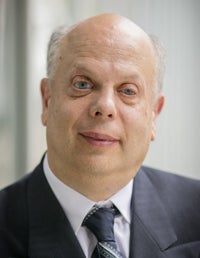David
Lepofsky, LLB,
Osgoode
Hall
Law
School, LL.M,
Harvard
Law
School
Chair,
Accessibility
for
Ontarians
with
Disabilities
Act
Alliance
Adjunct
Professor,
Osgoode
Hall
Law
School

Learn from David Lepofsky, visiting professor at the Osgoode Hall Law School and a disability community organizer and advocate, what this means for those who design this technology, and those who teach them.
David Lepofsky holds an LLB from the Osgoode Hall Law School (1979) and an LL.M from the Harvard Law School. He has been a member of the Ontario Bar since 1981, and an adjunct faculty member at the University of Toronto Faculty of Law since 1991.
From 1982 to 1988, David Lepofsky was counsel with the Crown Law Office (Civil) of the Ontario Ministry of the Attorney General. From 1988 to 1993, he was counsel with the Ministry's Constitutional Law & Policy Division where his practice focused primarily on litigating a diverse range of constitutional issues at all levels of the Canadian court system, and advising the Ontario government on constitutional matters.
From November 1993 to the end of 2015, he was counsel with the Crown Law Office (Criminal), where he argued criminal appeals for the Provincial Crown at the Court of Appeal and Supreme Court of Canada.
While working as a Crown counsel, he was promoted to the position of General Counsel. This is the highest promotion in the Ontario Public Service (outside management). Reserved for only a handful of the 2,000 lawyers in the Ontario Public Service, it is reserved for the most senior counsel, to recognize career achievement in handling the most complex work, demonstrated diversity of expertise, creativity, professional leadership, judgement, and mentoring/role modelling. On retiring from the Ontario Public Service, he is now a visiting professor at the Osgoode Hall Law School.
He has lectured widely on various aspects of constitutional and administrative law, human rights, disability rights and other topics across Canada, as well as in the U.S., Israel, Ireland, Denmark and Belgium.
Mr. Lepofsky is the author of Open Justice — the Constitutional Right to Attend and Speak About Criminal Proceedings in Canada, as well as numerous articles on constitutional and human rights topics. His publications have been cited with approval in several decisions of the Supreme Court of Canada, as well as by trial and appeal courts across Canada.
From 1998 to 2006, Mr. Lepofsky was Associate Head of the Public Law Section of the Bar Admission Course.
His volunteer community advocacy work for the rights of people with disabilities has led him to receive the Order of Canada, the Order of Ontario, honorary doctorates from Queens and the University of Western Ontario, and several other awards.
He was very flattered and humbled when the Canadian Lawyer Magazine August 2010 edition listed him among Canada’s 25 most influential lawyers. However, he was left wondering: “If I am so influential, why doesn’t anyone listen to me?”